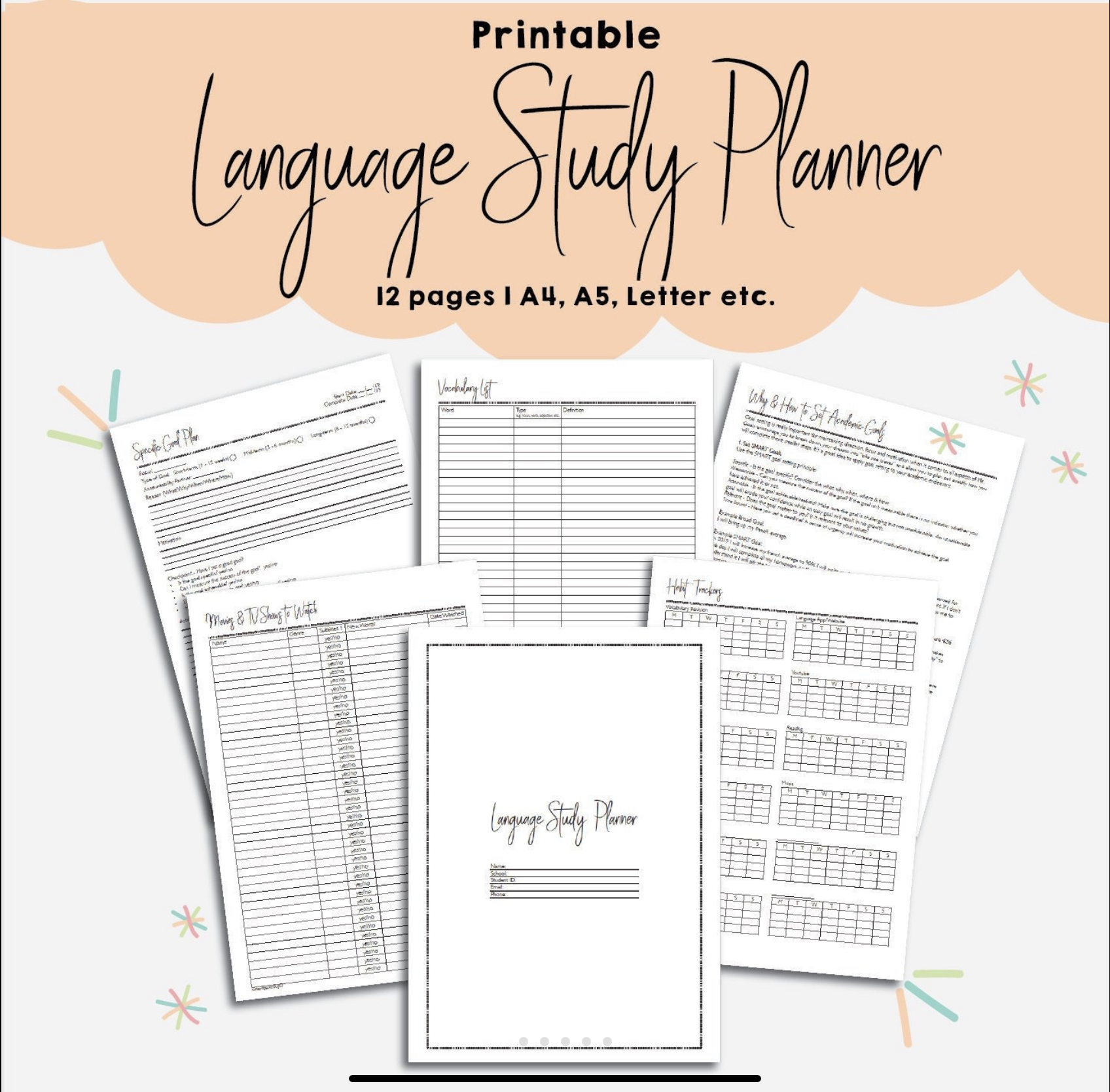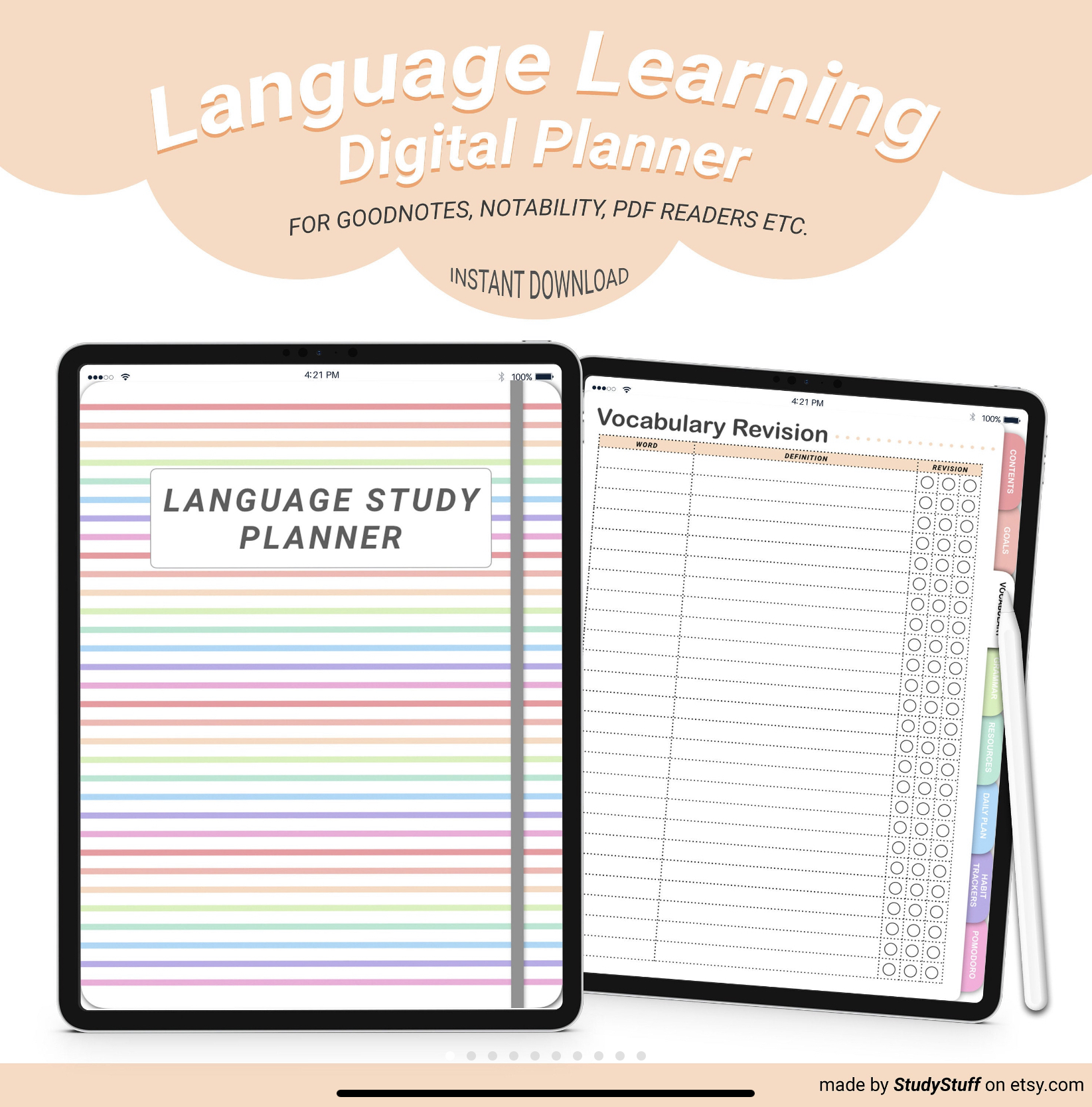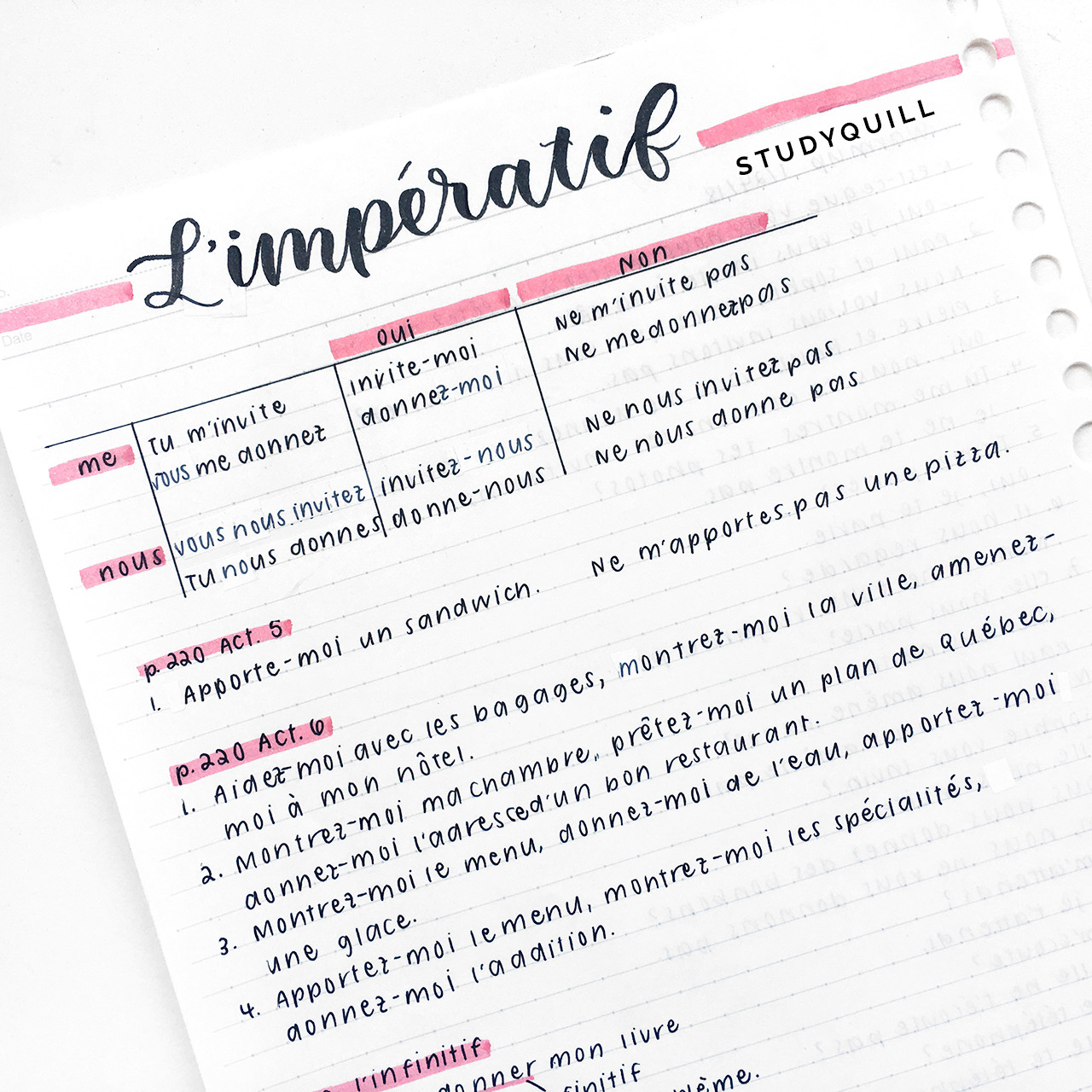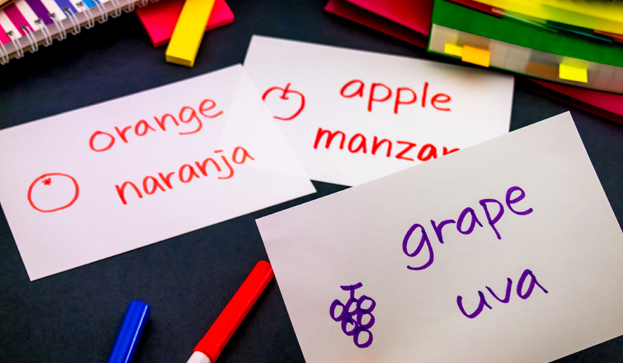
The EASIEST Way To Learn A Language By Yourself
Learning a language by yourself can be a challenge but is also extremely rewarding at the same time. Teaching yourself and then being able to say that you able to speak a second, third or maybe it’s even a fourth language is extremely satisfying and also looks extremely good on a resume, broadens your knowledge of the world and most importantly enables you to communicate with a lot more people that you would not have been able to do with just your native language.
To learn a language by yourself you need to set solid goals, make a habit out of learning and find a way to maintain a high level of motivation. You will then need to figure out what is the most suited method of learning for yourself in all areas of language learning (including vocabulary, grammar, writing & speaking). And then gather language resources by yourself because you don’t have the added help of a teacher or tutor and their bank of resources.
This may seem daunting at first however there are so many benefits of learning a language by yourself.
What’s holding you back?
Start learning today!
Benefits of learning a language by yourself
There are many benefits to learning a language by yourself such as…
1. When you self study a language you save a lot of money!
Guess what! When you start learning a language by yourself you don’t have to spend any money on costly language lessons and tutors.
There are so many free/very cheap resources online for pretty much any language you can think of.
For example, I have made a language study planner which you can read about here that has helped me tremendously in my journey of learning French. In particular, the handy printable vocabulary lists and goal setting pages.
And there are heaps of other resources online too, like apps like the famous Duolingo and even just content that is produced for a native speaker of a language that you can use such as news articles and movies.
Also don’t forget your local library that will have language books that you can borrow for free as well.

2. When you learn a language by yourself you can learn at a pace that is suited to you
Sometimes language lessons go too slowly or too fast. Learning a language by yourself fixes this problem because you are able to speed through what you find easy and focus more on the difficult concepts. There is no more waiting for other students to understand a concept while you want to go ahead in your learning or that horrible feeling of being left behind in the class. Self studying a language allows you to focus on your weaker areas and allows you to tail your learning to yourself and your specific needs.
For example,
- If you want to be able to have a conversation in Spanish… you have the option to spend more time practising speaking.
- If you want to be able to write an essay in Japanese… you have the option to spend more time practising writing.
3. When you learn a language by yourself you are in the comfort of your own home.
As touched on above, you have a lot more flexibility when you self study a language and it’s not only in the speed of learning but also when and where you study your language. When you are at home you can study whenever and wherever.
For example, you can study a bit of your language while cooking dinner by finding and following a recipe in your target language.
Or if it is just really cold you have the option of snuggling up on your couch with heaps of blankets to study your language.
You can’t do that in a language classroom!
Setting Goals As A Self Study Language Learner
Goal setting is really important for maintaining direction, focus and motivation when it comes to language learning, especially if you are learning a language by yourself and you don’t have guidance from a language teacher.
Goals encourage you to break down your dream of language fluency into bite size pieces and allows you to plan out exactly how you will complete those smaller steps.
I think it is extremely important to get SMART goals for language learning. This acronym helps you make better goals that you are more likely to achieve. It stands for:
- Specific
- Measurable
- Attainable
- Relevant
- Time Bound
In my language learning printable planner, there is a full A4 page explaining how and why to set language goals and shows you an example of an excellent language goal. There is also a fill out printable sheet so you can emulate this and plan out your own language goals, step by step with an action plan and also a reflection so you can improve and move forward.
Making Language Learning A Habit As A Self Taught Language Learner
After setting SMART language goals it is vital to make language learning a habit. This pretty much means that you should aim to include language learning in your daily routine.
There are lots of ways that you can integrate language learning into your daily routine. Personally I like to do a bit of practise in each area of language learning (listening, reading, writing, speaking) each day.
To make your language learning habit easier to integrate into your daily routine, write down a list of everything you do in a day and think about a way that you could do the tasks/activities in the language you are learning.
For example, if you read the news each morning, stop reading it in English and start reading it in the language you are currently learning. Or if you always watch Netflix, stop watching Netflix in English and start finding movies in French or Italian… you get the idea.
How to make listening practise a daily habit
- Listen to a podcast in your target language
- Watch a movie in your target language without subtitles
- Watch YouTube in your target language without subtitles
- Try doing a dictation (writing down what you hear) from the podcast, movie or video
How to make reading practise a daily habit
- Read the news in your target language
- Read a book/magazine in your target language. If you are a beginner you can start by reading children’s books and increase the difficulty as you improve.
- Find interesting online articles in your target language
- Find recipes in your target language and cook dinner using it
- Change the language of your phone into the language you are learning. Everytime you go onto your phone you will read something in the language you are studying
How to make writing practise a daily habit
- Write a diary/journal in your target language. Recount everything you did today in the language you are learning.
- Write about what you want to do today. Plan out your day in your target language. I have made a daily planner printable which you could use to schedule your day in the language you are learning.
- Try to do some creative writing in your target language
How to make speaking practise a daily habit
- Find a language exchange buddy and do a video call. Talk for 15min in English to help them and then 15min in the language you are studying
- If you are an Apple user, change the language of your phone into the language you are learning and talk to Siri
- Watch a movie, pretend to be a character and repeat all of their lines. If you want to get more ideas about how to effectively use a foreign language movie as a learning resource check out this article here.
If you struggle making habits that stick I suggest you find a printable habit tracker to put into your diary, hang up in your office/bedroom or put into your language learning workbook/binder. You can follow this link here if you would like to check out the monthly habit tracker that I have designed myself.
How to Maintain Motivation While Learning A Language
Maintaining motivation is hands down the hardest thing to do when self studying a language or even just learning a language in general. The learning process has many highs and lows, and when you are learning by yourself it can be hard to pick yourself up and continue learning when you feel like you are not making progress. I think you just need to remember that language learning is difficult and requires a lot of time and effort. You are not in this alone.
Here are some ways to overcome a loss of motivation:
1. Find an accountability partner for language learning
One way to overcome feeling unmotivated is to find an accountability partner. Now you might be thinking – what is an accountability partner?
For language learning an accountability partner is someone who is also trying to learn a language and you mutually agree to support each other throughout the language learning journeys and provide feedback on a regular basis. In your sessions where you give feedback you can share your struggles and challenges but also the positives and give each other advice.
An accountability partner works nicely in the situation of self studying a language as you can both remind each other of your goals and make sure you are on track to achieving them.
2. Make the learning process fun and worthwhile
One reason for lack of motivation is that you are not enjoying learning a language that much which can lead to a cycle of procrastination and not seeing improvement. It is so important to make language learning fun so you want to learn more. There is no point sitting through endless grammar exercises if you find them boring (I’m not saying that you shouldn’t do grammar exercises, rather that you should balance your learning with activities that you enjoy).
I’m putting forward pretty much the same idea as what I wrote about in the habit forming section of this blog post. Make a list of things that you really enjoy doing. This might be sport, watching movies or baking and then think of ways that you can do these activities in the language you are learning.
If you enjoy what you are learning/the method you are using for language learning you will want to put more time and effort into your learning = success.
You should also think about why you are learning the language. It can remind you of your goals and further boost your motivation to put the time into learning. It’s kind of like being your own accountability partner.
How to learn vocabulary when you are learning a language by yourself
Whenever you are doing something related to language learning whether that is reading, watching a movie, cooking etc. have a seperate book or printable vocabulary sheet to jot down all of the new words you come across.
Personally I like to seperate vocabulary lists into topics. For example, school vocabulary or colour vocabulary etc. And to study the words I either use the revision tracker to tick off each time I get it correct or make them into flashcards and use the spaced repetition system for effective learning. I like using both physical flashcards with a spaced repetition box system and also digital flash cards on apps like quizlet, studies or anki.
Another method of vocabulary learning that I recently came across is learning words in context. This pretty much means that you are learning your vocabulary in short phrases that often occur. For example, instead of learning the words ‘brush’ and ‘teeth’ separately you would learn the phrase ‘brush your teeth’. Other examples would be ‘commit a crime’ and ‘paint a picture’ etc.
Learning grammar when you are learning a language by yourself
It is not too difficult learning grammar as a self taught language learner. There are plenty of free resources online which can aid in the process and if you are unsure about a grammar point (or anything about a language) there are heaps of online forums dedicated to language learners to help you out.
You can find plenty of websites that explain grammar points or get a textbook/workbook. You could either buy one or borrow one for free from your local library. Another way to learn grammar is by finding grammar lessons in video form on YouTube or even by using a language learning app like duolingo, babbel or fluentu (to name a few off the top of my head). However keep in mind that some of these applications require a monthly paid subscription.
While learning I think it is important to jot down main ideas and examples in your target language and that is why on my Digital Language Learning Planner I have added new pages dedicated to grammar learning as well as note taking pages in Cornell style as well as lined and grid pages. The grammar learning pages help you learn verb conjugations as well as allows you to create a short summary overview of all the grammar points you have learned with a section to write down examples in your target language. This can be a really good revision sheet as it forces you to summarise and really focus on the most important information.
After reading through and writing notes about a grammar point it is vital to put your new knowledge to practise by doing grammar exercises. Again you can find these online, something like a fill in the gap exercise for conjugations, agreements or something similar and the best thing about these online resources is that not only are they free but also can automatically mark/grade your work which makes it really easy for yourself. You can also practise your new grammar skills by doing writing exercises and emulating the examples of grammar points you have written notes about (hopefully in your digital language planner).
How to practise speaking when you are studying a language by yourself
Speaking practise as a self taught language learner is the hardest language learning area that you are going to come across but don’t worry there are some ways that you can practise your speaking skills. Here is a list of ideas:
- Join a local language conversation group
- If you have an iPhone, change the language of your phone and talk to Siri
- Find an online conversation exchange partner and practise speaking over video call
- Have pretend conversations with yourself out loud (or talk to your pet)
- Use the shadowing technique where you watch a movie or listen to a podcast, pause and then repeat the pronunciation of what they are saying
- Go travelling and initiate conversations with locals
My favourite resources for independently learning a language
1. Language learning with Netflix chrome extension
This is a really handy chrome extension that displays both the subtitles of your target language and the subtitles of your native language at the same time (one underneath the other) while watching Netflix from a google chrome browser. A feature that I find really handy is that you can click on a word that you don’t know and it will give you a dictionary definition. It makes writing down words and definitions while consuming media so much easier!
2. Social media
There are so many forms of social media today such as Instagram, YouTube, Twitter, TikTok (just to name a few) and there are so many users of these platforms from all around the world. It makes so much sense to start following native speakers of the language you are studying so when you are scrolling through Instagram for example, you will be reading captions in your target language. It’s study without even realising it!
The other social media platform that I highly recommend following people in your target language is YouTube. YouTube is great because you can learn more conversational phrases that you would not find in a textbook. Also the videos are usually a shorter form, around 10 minutes on average, which is a good length to pause and relisten to pronunciation etc.
3. Lyrics training app /website
The lyrics training app is a really fun way to practise your listening skills by filling in blank words of lyrics from a song in your target language. It’s kind of like karaoke but for language learning.
4. Wordreference.com, google translate, physical dictionary
This one is very self explanatory. It is impossible to learn a language without some form of dictionary whether that is online or a physical one so you can learn new vocabulary!
5. Online Language CoursesRocket Languages
Rocket Languages
Rocket Languages is an online and app based language learning course. They offer over twelve languages and for each course you subscribe to you get over 120 hours of lessons. Check out Rocket Languages here!
Rype
Rype is a platform where you can get one-on-one personalised language lesson with pre-vetted teachers online. You can take lessons from the comforts of your home or on-the-go and around your busy schedule. Book a one-on-one video call lesson on Rype here!
Lingoda
Lingoda is an online language learning school. They offer 60-minute small group or private classes run by native speaking, qualified teachers. You can learn at whatever time suits you as the classes run 24 hours a day, 7 days a week.
Common mistakes that self taught language learners make
1. Not setting goals
Without goals you will not progress as an independent language learner as it is all on yourself to make progress and achieve. You don’t have anyone guiding you in the process so that is why I suggest you get a language learning planner with a guided goal setting plan.
2. Not making language learning a habit
When you are teaching yourself a language it is so important to make learning a habit because you have no weekly language class, language tutor or similar to keep you on track. As I said above in that habit section of this article it is a good idea to spend at least 10-15 minutes (or more) each day with the language you are learning. Even the smallest bit of exposure each day will make you progress in your skills.
3. Passively learning the language
This applies to all areas of learning. It is a waste of time to passively learn. Active learning is when a student interacts or participates while learning instead of passively sitting back and absorbing knowledge. There is a whole lot of research out there on how active learning improves your learning and memory because you work your brain more and make stronger connections between facts and information. I highly recommend you read more about it.
Here is a table of ways you can change passively studying a language to actively studying it:
| Passive language learning | Active language learning |
| Watching a foreign language film on your bed | Sit at your desk with a printable vocabulary page and pause the movie every now and then to jot down new vocabulary and interesting phrases |
| Re-reading notes to study a concept | After reading a paragraph, cover up the information with another piece of paper and talk about what you just read out loud or write a paragraph about it without looking. Then re-read the information and see what information you missed out on and study again. |
3. Getting discouraged by making mistakes
As a language learner it is inevitable to make mistakes and as embarrassing as they can sometimes be, making mistakes is one of the best ways to improve your knowledge. Mistakes help people learn information better than if no mistakes are made at all.
Next time you make a mistake, look back at it, see where you went wrong and then move forward. Remember mistakes are a part of the learning process.
4. Not giving yourself enough time
You can’t expect to be fluent in 7 days like how some people claim over the Internet. Language learning is a long and trying journey and you need to make realistic short term, mid term and long term goals. Be kind to yourself. If you put in the effort, you will see success.
Before you leave!!!

If you are really serious about teaching yourself a language I would really suggest you checking out either my printable language learning planner or digital language learning planner. I have used this resource myself in my studies of French and it has really helped me stay motivated to work towards achieving my goal of fluency. This planner is designed by a language learner for a language learner and will help you achieve your language goals. I have experienced the highs and lows of language learning and this planner has really helped me stay on track.
If you want more information about what exactly is a language learning planner and how it can aid your language studies don’t hesitate to check out my article where I go into depth about how a language learning planner can boost independent language study.
Join more than 1,212,346 people from 192 countries and learn a new language at your own pace at Rocket Languages!
Check Out The Online Courses Below:
The best ways to learn a language without going to classes include: watching foreign language films on Netflix, using a …
There are many different note taking methods that can work well for language learning. To take effective notes for language …
If you are working full time and you want to learn a language, you need to make the most of …
Kinesthetic learners are the most physical of all learning styles meaning they absorb information through movement, touch and motion. Therefore, …
65% of the population are visual learners and therefore learn best by using images, graphics, colours, computers, books and other …
Flashcards are effective for language learning if you make and study them in the correct way. This is by making …








